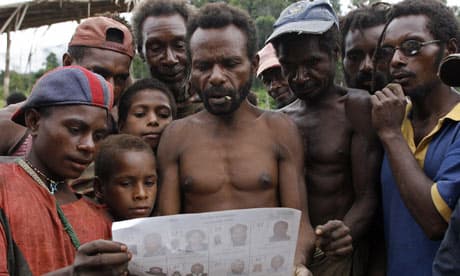Do indigenous people benefit from 'development'?
We need to think about whether development brings any benefits to those who are largely self-sufficient – like many of the world's 150 million tribal people including many Papua New Guineans

By Stephen Corry*
What's "development" for? That may be straightforward to people who don't have water or food, or sewerage in urban areas (faecal contamination is the biggest, easily preventable, manmade killer). But, although millions still lack such basics, they form only a tiny part of what passes for development these days. The duplicity of politics and business ensures much else – arms, for example – is shoehorned into the same category.
What should development mean for those who are largely self-sufficient, getting their own food and building their dwellings where the water is still clean – like many of the world's 150 million tribal people? Has development got anything helpful for them, or has it simply got it in for them?
It's easy to see where it has led. Leaving aside the millions who succumbed to the colonial invasion, in some of the world's most "developed" countries (Australia, Canada and the US) development has turned most of the survivors into dispossessed paupers. Take any measure of what it ought to mean: high income, longevity, employment, health; low rates of addiction, suicide, imprisonment and domestic violence, and you find that indigenous people in the US, Canada and Australia are by far the worst off on every count – but no one seems to heed the lesson.
These are the consequences of a dispossession more total in North America and Australia than almost anywhere on Earth. The colonists were determined to steal tribal lands, and unquestioning about their own superiority. They espoused politico-economic models in which workers produced for distant markets, and had to pay for the privilege. The natives, using no money, paying no taxes, contributing little to the marketplace until forced to, were "backward". At best, they were to be integrated to serve colonist society.
Colonialism set out to take away their self-sufficiency, on their own territory, and lead them to glorious productivity, as menials, on someone else's. There's little point in calling for retroactive apologies for this because it's not confined to the past: most development schemes foisted on tribal peoples today point in exactly the same direction.
Two of its main themes are housing and education. Traditional housing has many benefits – not least the fact that it's free – but development decrees it must be replaced by modern dwellings. In West Papua, the tribespeople put their pigs in the new houses and live in the old. Rwanda recently outlawed thatch altogether; everyone must use metal sheets, by law.
So what about modern education? In Australia, mixed-race children were forced into distant boarding schools to "breed out" their "Aboriginalness" and turn them into an underclass. From frozen Siberia to sunlit Botswana, boarding schools remain a main plank in integrationist policies, which destroy more than educate. It's no hidden conspiracy: it's openly designed to be about turning people into workers, scornful of their own tribal heritage.
Many indigenous people have observed that even the modern medical attention they might receive from the wealthiest governments doesn't begin to solve the illnesses the same government's policies have inflicted on them. It isn't "backwardness" that makes many tribal peoples reject development projects, it's rational anxiety about the future.
As for largescale infrastructure development – dams and mines, even irrigation – its real effect on the ground is invariably to enrich the elites while impoverishing the locals.
So is it possible to offer tribal peoples any truly beneficial development? Yes, if we accept their right to reject what we, with our "advanced" wisdom, can give; we have to stop thinking them childish when they make decisions we wouldn't. Everyone wants control over their future, and not everyone wants the same things out of life, but such truisms are hardly ever applied.
Development, at least for most tribal peoples, isn't really about lifting people out of poverty, it's about masking the takeover of their territories. The deception works because the conviction "we know best" is more deeply ingrained even than it was a generation ago; Victorian-era levels of narrow-mindedness are returning. As a Botswana Bushman told me: "First they make us destitute by taking away our land, our hunting and our way of life. Then they say we are nothing because we are destitute."
In a 21st century of expensive water, food, housing, education, healthcare and power, self-sufficiency has its attraction. It may not boost GDP figures, but there are many tribal peoples in the world who live longer and healthier lives than millions in nearby slums. Who's to say they've made a bad choice?
* Stephen Corry is director of Survival International and author of Tribal Peoples for Tomorrow's World
